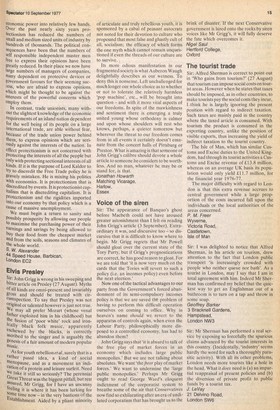The tourist trade
Sir: Alfred Sherman is correct to point out in 'Who gains from tourism?' (27 August) that tourism can impose social costs on tourist areas. However when he states that taxes ' should be imposed, as in other countries, to make tourists pay the social costs they incur, I. think he is largely ignoring the present position with regard to indirect taxation. Such taxes are mainly paid in the country where the taxed article is consumed. With tourism the product is consumed in the exporting country, unlike the position of visible exports, thus increasing the yield of indirect taxation to the tourist country.
The Isle of Man, which has similar Customs and Excise duties to the United Kingdom, had through its tourist activities a Customs and Excise revenue of £13.8 million, whereas on an average UK basis its population would only yield £11.7 million, for the financial year 1976-77.
The major difficulty with regard to London is that this extra revenue accrues to central government while a large proportion of the costs incurred fall upon the individuals or the local authorities of the areas concerned.
P. M. Freer
Wyverne, Victoria Road, Castletown, Isle of Man Sir: I was delighted to notice that Alfred Sherman, in his article on tourism, drew attention to the fact that London public transport 'is increasingly crowded with people who neither queue nor bath'. As a tourist in London, may I say that 1 am in total agreement with him. Indeed Mr Sherman has confirmed my belief that the quickest way to get an Englishman out of a bathroom is to turn on a tap and throw in some soap.
Geoffrey Barker
3 Bracknell Gardens, Hampstead, London NW3 Sir: Mr Sherman has performed a real service by exposing so forcefully the spurious claims advanced by the tourist interests in this country. (Incidentally, 'industry' seems hardly the word for such a thoroughly parasitic activity). With all its other problems, London needs more tourists like a hole in the head. What it does need is (a) an impartial reappraisal of present policies and (b) the diversion of private profit to public funds by a tourist tax.
J. LeVay
21 Delvino Road, London SW6






























 Previous page
Previous page